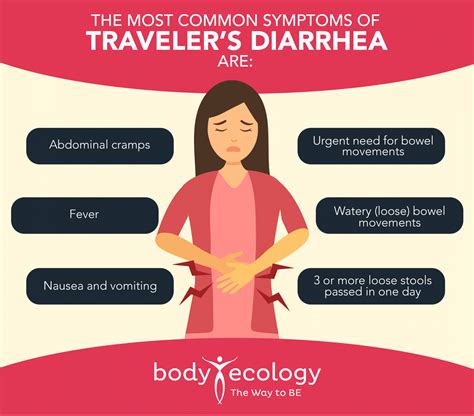5 Ways Travelers Diarrhea Happens

Introduction to Traveler’s Diarrhea
Traveler’s diarrhea is a common health issue that affects millions of travelers every year. It is estimated that up to 50% of international travelers will experience some form of traveler’s diarrhea during their trip. The condition is characterized by loose, watery stools, often accompanied by abdominal cramps, bloating, and fever. Traveler’s diarrhea can be caused by a variety of factors, including bacterial, viral, and parasitic infections. In this blog post, we will explore the 5 ways traveler’s diarrhea happens and provide tips on how to prevent and treat the condition.
Cause 1: Consuming Contaminated Food and Water
One of the most common ways traveler’s diarrhea happens is through the consumption of contaminated food and water. Bacteria, viruses, and parasites can contaminate food and water, especially in areas with poor sanitation and hygiene. Travelers who eat undercooked or raw meat, seafood, and eggs are at a higher risk of contracting traveler’s diarrhea. Additionally, unpeeled fruits and vegetables can also be contaminated with harmful pathogens. To reduce the risk of contracting traveler’s diarrhea, travelers should: * Eat cooked food that is hot and steaming * Avoid eating undercooked or raw meat, seafood, and eggs * Peel fruits and vegetables before eating * Avoid drinking tap water and ice
Cause 2: Poor Hand Hygiene
Poor hand hygiene is another common cause of traveler’s diarrhea. Failure to wash hands regularly can lead to the transmission of harmful pathogens, especially after using the bathroom or before eating. Travelers should: * Wash hands with soap and water for at least 20 seconds * Use hand sanitizer if soap and water are not available * Avoid touching their face, especially their mouth and eyes
Cause 3: Close Contact with Infected Individuals
Close contact with infected individuals can also spread traveler’s diarrhea. Person-to-person transmission can occur through direct contact with an infected person’s feces, vomit, or saliva. Travelers should: * Avoid close contact with individuals who have diarrhea or vomiting * Wash hands regularly, especially after coming into contact with an infected individual * Avoid sharing food, drinks, or utensils with others
Cause 4: Inadequate Vaccinations
Inadequate vaccinations can also increase the risk of contracting traveler’s diarrhea. Certain vaccinations, such as the hepatitis A vaccine, can protect against specific pathogens that cause traveler’s diarrhea. Travelers should: * Consult their doctor or a travel clinic to determine the necessary vaccinations for their destination * Ensure they are up-to-date on all recommended vaccinations
Cause 5: Weakened Immune System
A weakened immune system can also increase the risk of contracting traveler’s diarrhea. Travelers with compromised immune systems, such as those with HIV/AIDS or undergoing chemotherapy, are more susceptible to infections. Travelers should: * Consult their doctor or a travel clinic to determine the necessary precautions for their specific health condition * Take steps to boost their immune system, such as getting enough rest and eating a healthy diet
🚨 Note: Travelers should consult their doctor or a travel clinic before traveling to determine the necessary precautions and vaccinations for their destination.
In summary, traveler’s diarrhea can happen in a variety of ways, including consuming contaminated food and water, poor hand hygiene, close contact with infected individuals, inadequate vaccinations, and a weakened immune system. By taking the necessary precautions and being aware of the risks, travelers can reduce their chance of contracting traveler’s diarrhea and stay healthy during their trip. To recap, travelers should prioritize good hygiene, get vaccinated, and be mindful of their surroundings to minimize the risk of getting sick.
What is the most common cause of traveler’s diarrhea?
+
The most common cause of traveler’s diarrhea is consuming contaminated food and water.
How can I prevent traveler’s diarrhea?
+
To prevent traveler’s diarrhea, eat cooked food that is hot and steaming, avoid eating undercooked or raw meat, seafood, and eggs, peel fruits and vegetables before eating, and avoid drinking tap water and ice.
What are the symptoms of traveler’s diarrhea?
+
The symptoms of traveler’s diarrhea include loose, watery stools, abdominal cramps, bloating, and fever.